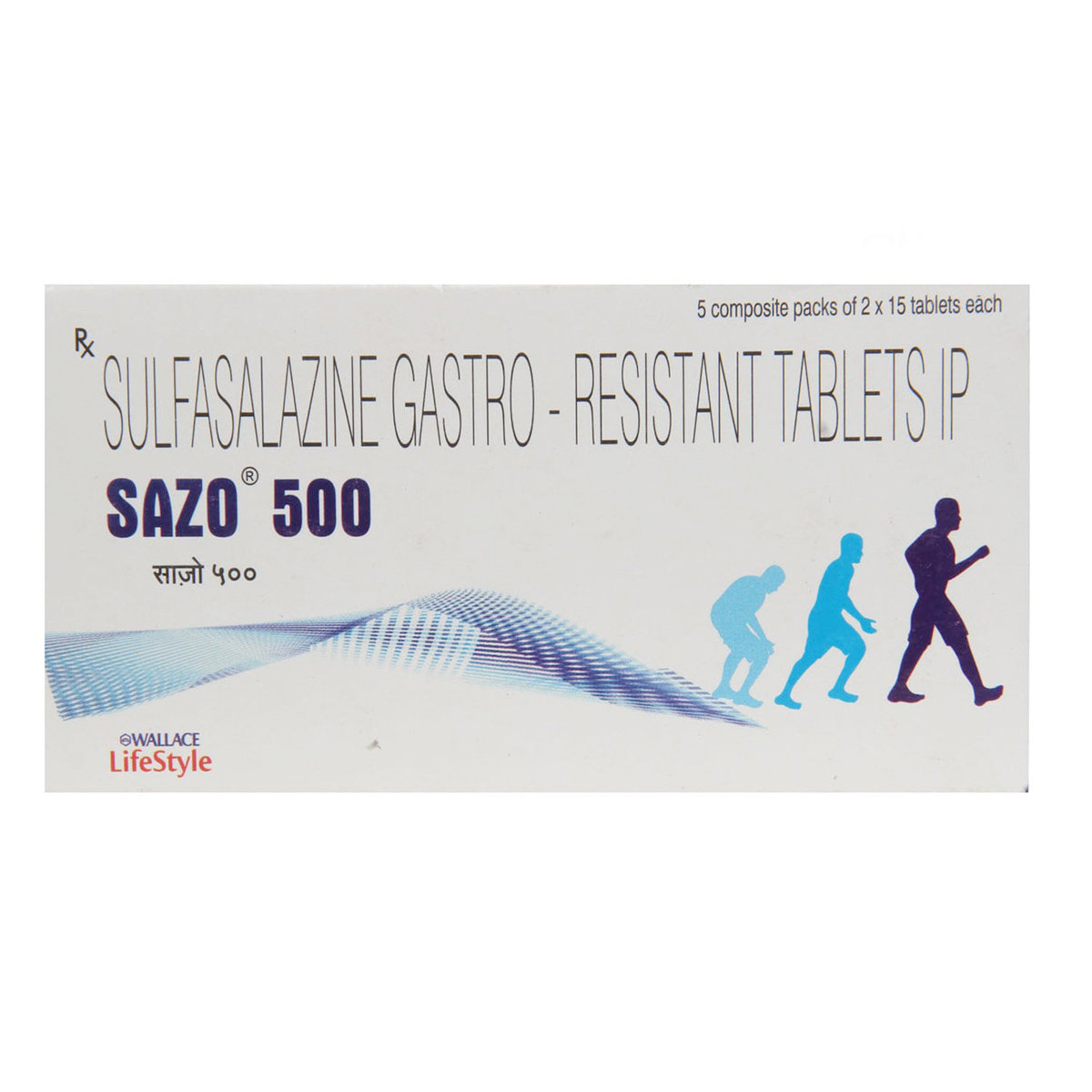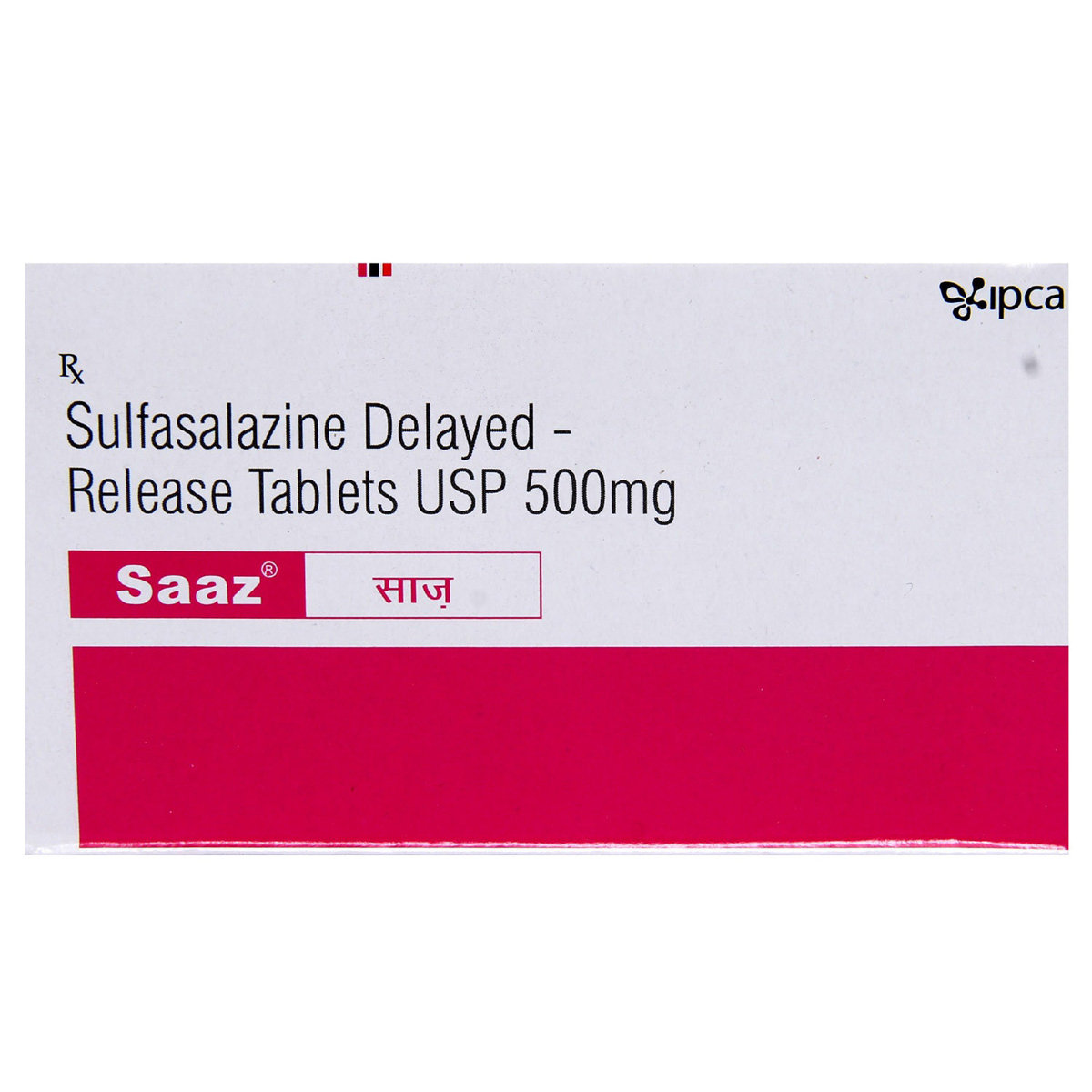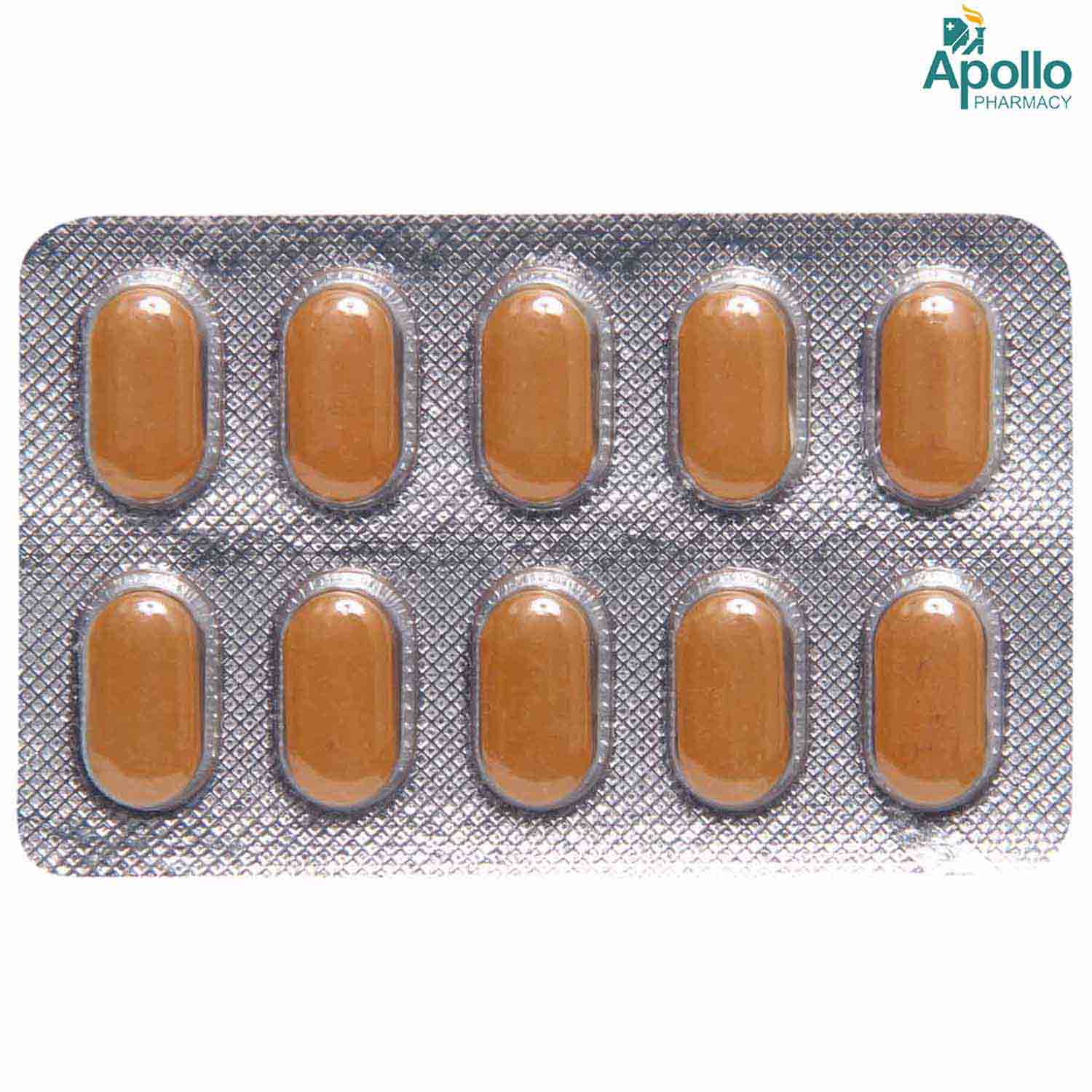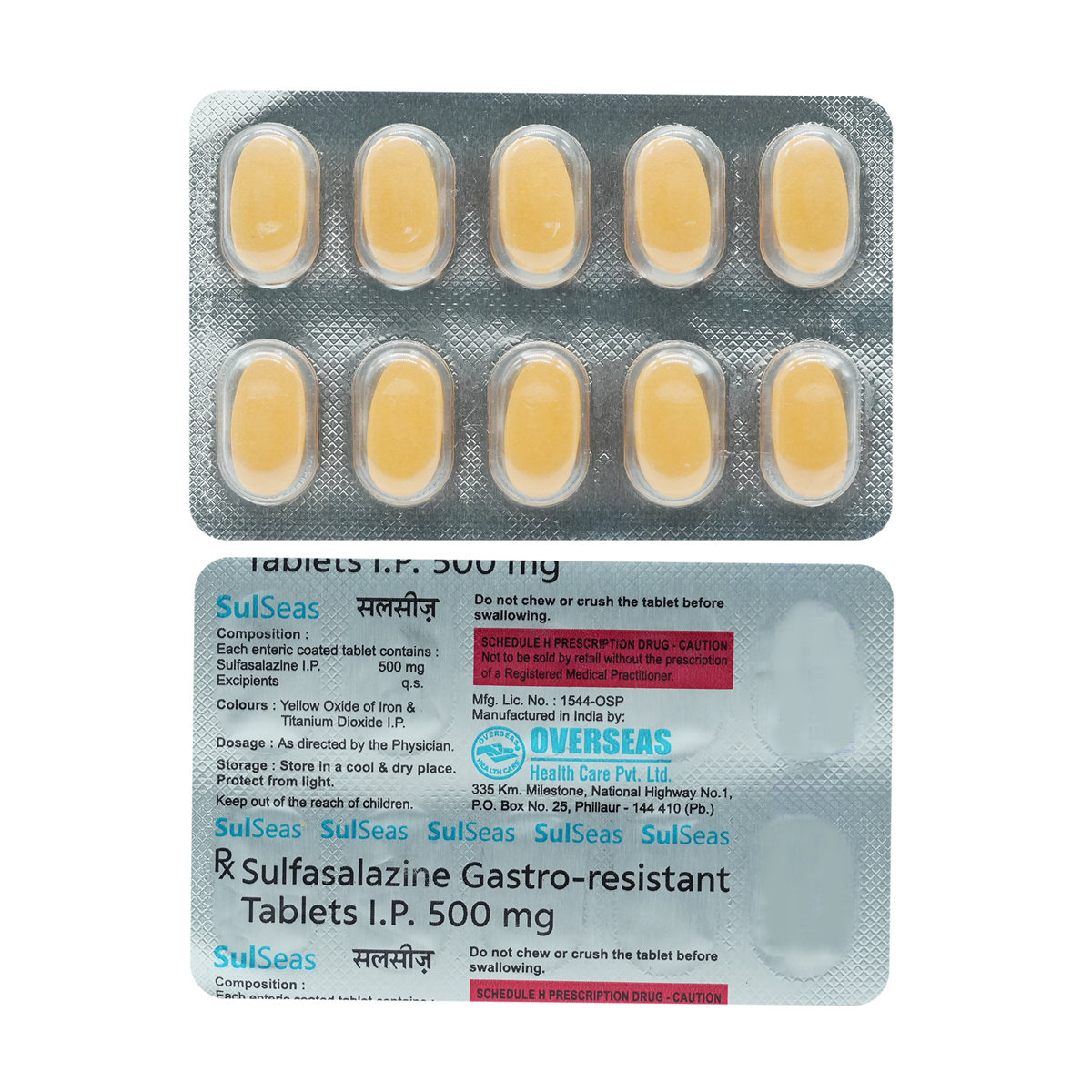Conisazz 500mg Tablet DR
MRP ₹43.6
(Inclusive of all Taxes)
₹6.5 Cashback (15%)
Provide Delivery Location
Online payment accepted
 Prescription drug
Prescription drugWhats That
Composition :
Manufacturer/Marketer :
Consume Type :
Return Policy :
About Conisazz 500mg Tablet DR
Conisazz 500mg Tablet DR belongs to a class of anti-inflammatory medicines known as ‘aminosalicylates’ and ‘disease-modifying anti-rheumatic drug’ (DMARD) which treats bowel diseases (ulcerative colitis, Crohn's disease), skin-related problems (psoriasis), and chronic joint diseases (rheumatoid arthritis, ankylosing spondylitis) in the children and adults.
Conisazz 500mg Tablet DR works as an inflammation reducer by acting locally, inhibiting the formation of a chemical known as prostaglandins which control pain and inflammation. Together it helps reducing the inflammation of the intestine, skin, and joints.
Your doctor will advise you on how often you take your tablets based on your medical condition. In some cases, you may experience a sore throat, a fever, unexplained bruising, or ringing in your ears (tinnitus). Most of these side effects of Conisazz 500mg Tablet DR do not require medical attention and gradually resolve over time. However, if the side effects are persistent, please reach out to your doctor.
Conisazz 500mg Tablet DR can also lower your sperm count leading to a temporary decrease in male fertility. In this case, you can speak to your doctor. Your doctor might arrange a blood test before you start taking Conisazz 500mg Tablet DR. You can continue taking Conisazz 500mg Tablet DR to prevent flares up during the pregnancy. Besides this, your doctor may prescribe additional folic acid supplements during pregnancy because Conisazz 500mg Tablet DR may reduce the level of folic acid in your body. Conisazz 500mg Tablet DR can be safely taken while you are breastfeeding unless the baby is premature or at risk of jaundice.
Uses of Conisazz 500mg Tablet DR
Directions for Use
Key Benefits
Conisazz 500mg Tablet DR works by reducing the inflammation in the colon. It inhibits the formation of a chemical, prostaglandin which controls inflammation. Together it helps in reducing the inflammation at all the sites like joints, skin, and bowel (intestines) thereby treating a wider range of joint, skin and bowel diseases including ulcerative colitis, Crohn's disease, rheumatoid arthritis, ankylosing spondylitis, psoriatic arthritis, juvenile idiopathic arthritis. Conisazz 500mg Tablet DR is not a pain killer rather it is an anti-inflammatory.
Storage
- Inform your doctor about the nausea and discuss possible alternatives to the medication or adjustments to the dosage.
- Divide your daily food intake into smaller, more frequent meals to reduce nausea.
- Opt for bland, easily digestible foods like crackers, toast, plain rice, bananas, and applesauce.
- Avoid certain foods that can trigger nausea, such as fatty, greasy, spicy, and smelly foods.
- Drink plenty of fluids, such as water, clear broth, or electrolyte-rich beverages like coconut water or sports drinks.
- Use ginger (tea, ale, or candies) to help relieve nausea.
- Get adequate rest and also avoid strenuous activities that can worsen nausea.
- Talk to your doctor about taking anti-nausea medication if your nausea is severe.
- Record when your nausea occurs, what triggers it, and what provides relief to help you identify patterns and manage your symptoms more effectively.
- Hydrate your body: Drink enough water to prevent dehydration and headaches.
- Calm Your Mind: Deep breathing and meditation can help you relax and relieve stress.
- Rest and Recharge: Sleep for 7-8 hours to reduce headache triggers.
- Take rest: lie down in a quiet, dark environment.
- Cold or warm compresses can help reduce tension.
- Stay Upright: Maintain good posture to keep symptoms from getting worse.
- To treat headaches naturally, try acupuncture or massage therapy.
- Over-the-counter pain relievers include acetaminophen and ibuprofen.
- Prescription Assistance: Speak with your doctor about more substantial drug alternatives.
- Severe Headaches: Seek emergency medical assistance for sudden, severe headaches.
- Frequent Headaches: If you get reoccurring headaches, consult your doctor.
- Headaches with Symptoms: Seek medical attention if your headaches include fever, disorientation, or weakness.
- Firstly, consult a fertility specialist to identify the underlying cause of low sperm count and discuss possible treatment options.
- To improve overall health and fertility do exercises regularly.
- Improve hormone levels and semen quality by reducing stress through yoga, meditation, or deep breathing.
- Maintain a healthy weight to support hormone levels and improve sperm count.
- To enhance the quality of semen, increase antioxidants such as vitamins C and E.
- Eat omega-3-rich foods like salmon and walnuts to improve sperm count.
- Avoid smoking and excessive drinking to protect semen quality and fertility.
- Skin rash caused by allergies is due to irritants or allergens. Therefore, avoid contact with such irritants.
- Consult your doctor for proper medication and apply an anti-itch medication. Follow the schedule and use the medication whenever needed.
- Protect your skin from extreme heat and try to apply wet compresses.
- Soak in the cool bath, which gives a soothing impact to the affected area.
- Boost your immunity by including immune-rich foods in your diet, and always remember to stay hydrated.
- Get sufficient sleep and manage stress, which helps improve white blood cell count.
- Consult your doctor for an effective treatment to improve immunity and get regular body check-ups to monitor changes in the count.
- Exercise regularly to lower stress and improve stamina and immunity.
- Smoking can affect immunity. It is advisable to avoid such a habit.
- Practice good hygiene practices to lower the chances of falling sick.
- Preventing Vomiting (Before it Happens)
- Take medication exactly as prescribed by your doctor. This can help minimize side effects, including vomiting.
- Having a small meal before taking your medication can help reduce nausea and vomiting.
- Talk to your doctor about taking anti-nausea medication along with your prescribed medication.
- Managing Vomiting (If it Happens)
- Try taking ginger in the form of tea, ale, or candy to help alleviate nausea and vomiting.
- What to Do if Vomiting Persists
- Consult your doctor if vomiting continues or worsens, consult the doctor for guidance on adjusting your medication or additional treatment.
Drug Warnings
Conisazz 500mg Tablet DR treatment is generally considered to be safe during pregnancy, but its usage in pregnant mothers should be discussed with the doctor if planning for pregnancy. This medication should be avoided in breastfeeding mothers as it passes into the milk and causes jaundice and brain problems in infants less than 2 years of age. Tell your doctor if you have an allergy to any other sulpha drugs (sulfonamide antibiotic) as it may cause serious skin allergies like urticaria and stevens johnson’s syndrome. In men, an intake of Conisazz 500mg Tablet DR may lower the sperm count, which improves after stopping this medicine. Tell your doctor if you have asthma, wheezing, fever, breathing difficulties, sudden severe skin rash, unusual bleeding, sore throat, fever, unexplained bruising, or any other symptoms of infection. Use of Conisazz 500mg Tablet DR may change the colour of your urine, contact lenses, and tears to yellow/orange and even make your skin more sensitive to the sunlight. But, this is normal, harmless, and nothing to worry about. You may low folic acid in pregnancy while taking Conisazz 500mg Tablet DR so your doctor might prescribe you iron or folic acid supplements.
Drug-Drug Interactions
Drug-Drug Interactions
Login/Sign Up
Coadministration of Cidofovir with Conisazz 500mg Tablet DR can increase the risk or severity of kidney problems.
How to manage the interaction:
Taking Conisazz 500mg Tablet DR with Cidofovir is not recommended, but can be taken together if prescribed by a doctor. However, if you experience nausea, vomiting, loss of appetite, increased or decreased urination, sudden weight gain or loss, fluid retention, swelling, shortness of breath, muscle cramps, tiredness, weakness, dizziness, confusion, or an irregular heart rhythm, consult a doctor. Do not discontinue any medications without consulting a doctor.
Coadministration of Deferasirox and Conisazz 500mg Tablet DR may increase the risk or severity of kidney problems.
How to manage the interaction:
Although taking Conisazz 500mg Tablet DR and Deferasirox together can possibly result in an interaction, it can be taken if your doctor has prescribed it. However, if you experience nausea, vomiting, loss of appetite, increased or decreased urination, fluid retention, swelling, shortness of breath, bone pain, muscle cramps, tiredness, weakness, dizziness, confusion, or irregular heart rhythm, seek immediate medical attention. Drink plenty of water if you experience diarrhoea or vomiting while taking these medications, as dehydration can potentially affect the kidneys. Do not discontinue any medications without a doctor's advice.
Coadministration of bupivacaine and Conisazz 500mg Tablet DR may result in methemoglobinemia, an uncommon disorder that lowers the blood's ability to carry oxygen, which can induce oxygen deprivation in tissues and essential organs.
How to manage the interaction:
Although taking bupivacaine and Conisazz 500mg Tablet DR together can result in an interaction, it can be taken if a doctor has advised it. However, if you experience symptoms such as grey discoloration of the skin, abnormal blood coloration, nausea, headache, dizziness, lightheadedness, fatigue, shortness of breath, rapid or shallow breathing, a rapid heartbeat, palpitation, anxiety, or confusion, consult a doctor immediately. Do not discontinue any medications without consulting a doctor.
Coadministration of Conisazz 500mg Tablet DR with Prilocaine can increase the risk of methemoglobinemia, (a rare red blood cell disorder in which oxygen carrying effectively reduces).
How to manage the interaction:
Although taking Prilocaine and Conisazz 500mg Tablet DR together can result in an interaction, it can be taken if your doctor has advised it. However, if you experience symptoms such as gray discoloration of the skin, abnormal blood coloration, nausea, headache, dizziness, lightheadedness, fatigue, shortness of breath, rapid or shallow breathing, a rapid heartbeat, palpitation, anxiety, or confusion, consult a doctor immediately. Do not discontinue any medications without consulting a doctor.
Taking tacrolimus with Conisazz 500mg Tablet DR will have an additive effect and may increase the risk of kidney problems.
How to manage the interaction:
Although taking tacrolimus and Conisazz 500mg Tablet DR together can possibly result in an interaction, it can be taken if your doctor has prescribed it. However, consult the doctor immediately if you experience symptoms such as nausea, vomiting, loss of hunger, increased or decreased urination, sudden weight gain or weight loss, fluid retention, swelling, shortness of breath, muscle cramps, tiredness, weakness, dizziness, confusion, and irregular heart rhythm. Do not discontinue any medications without consulting a doctor.
Coadministration of Conisazz 500mg Tablet DR with Procaine can increase the risk of methemoglobinemia, (a rare red blood cell condition where the oxygen-carrying capacity decreases).
How to manage the interaction:
Although taking Procaine and Conisazz 500mg Tablet DR together can result in an interaction, it can be taken if your doctor has advised it. However, if you experience symptoms such as gray discoloration of the skin, abnormal blood coloration, nausea, headache, dizziness, lightheadedness, fatigue, shortness of breath, rapid or shallow breathing, a rapid heartbeat, palpitation, anxiety, or confusion, consult a doctor immediately. Do not discontinue any medications without consulting a doctor.
Coadministration of teriflunomide with Conisazz 500mg Tablet DR can increase the risk or severity of side effects.
How to manage the interaction:
Although taking Teriflunomide and Conisazz 500mg Tablet DR together can result in an interaction, it can be taken if your doctor has advised it. However, if you experience symptoms such as paleness, fatigue, dizziness, lightheadedness, unusual bleeding or bruising, fever, chills, diarrhea, sore throat, muscle aches, shortness of breath, blood in phlegm, weight loss, red or inflamed skin, body sores, and pain or burning during urination, consult a doctor immediately. Do not discontinue any medications without consulting a doctor.
Coadministration of Sirolimus together with Conisazz 500mg Tablet DR may increase the risk or severity of kidney problems.
How to manage the interaction:
Taking Sirolimus with Conisazz 500mg Tablet DR together can result in an interaction, but it can be taken if a doctor has advised it. Contact a doctor if you experience symptoms such as nausea, vomiting, loss of appetite, increased or decreased urination, sudden weight gain or weight loss, fluid retention, swelling, shortness of breath, muscle cramps, tiredness, weakness, dizziness, confusion, and irregular heart rhythm. Do not stop using any medications without a doctor's advice.
Coadministration of Conisazz 500mg Tablet DR and Tenofovir disoproxil can increase the risk of kidney problems.
How to manage the interaction:
Taking Conisazz 500mg Tablet DR and Tenofovir disoproxil together can lead to an interaction, but it can be taken if your doctor advises. However, if you experience any symptoms like nausea, vomiting, loss of appetite, increased or decreased urination, sudden weight gain or weight loss, swelling, shortness of breath, bone pain, muscle cramps, tiredness, weakness, dizziness, confusion, and irregular heart rhythm, contact your doctor immediately. Do not discontinue any medications without consulting your doctor.
Coadministration of Conisazz 500mg Tablet DR with Ropivacaine can increase the risk of methemoglobinemia, (a rare red blood cell condition where the oxygen-carrying capacity decreases).
How to manage the interaction:
Although taking Ropivacaine and Conisazz 500mg Tablet DR together can result in an interaction, it can be taken if your doctor has advised it. However, if you experience symptoms such as gray discoloration of the skin, abnormal blood coloration, nausea, headache, dizziness, lightheadedness, fatigue, shortness of breath, rapid or shallow breathing, a rapid heartbeat, palpitation, anxiety, or confusion, consult a doctor immediately. Do not discontinue any medications without consulting a doctor.
Drug-Food Interactions
Drug-Food Interactions
Login/Sign Up
Diet & Lifestyle Advise
- It is advised to drink plenty of water to prevent the occurrence of kidney stones.
- Take low fibre foods such as white rice, white pasta, bread, egg, fish, tofu, butter, etc. to avoid triggering ulcerative colitis.
- Exercise regularly to suppress inflammation in the body.
- Manage stress by doing meditation and deep breathing exercises.
- Eat smaller meals to avoid pain in the stomach.
- Avoid foods that can increase or worsen ulcerative colitis such as milk, milk products, raw fruits and vegetables, beans, spicy foods, popcorn, artificial sweeteners, nuts, seeds, and fatty foods.
Side Effects of Conisazz 500mg Tablet DR
- Headache
- Indigestion
- Nausea
- Watery diarrhoea
Habit Forming
Therapeutic Class
All Substitutes & Brand Comparisons
RX
Out of StockSSN 500 Tablet DR
₹63
(₹3.78 per unit)
3% CHEAPERRX
Sulfalet 500 mg Tablet 10's
Brinton Pharmaceuticals Ltd
₹44
(₹3.96 per unit)
1% COSTLIERRX
Sazowin-500 Tablet 10's
Innovative Pharmaceuticals Pvt Ltd
₹46
(₹4.05 per unit)
3% COSTLIER
Drug-Diseases Interactions
Drug-Diseases Interactions
Login/Sign Up
FAQs
Drug-Drug Interactions Checker List
- WARFARIN
- DIGOXIN
- GLIMEPIRIDE
- GLYBURIDE
- GLIPIZIDE
- METHENAMINE
- AZATHIOPRINE
- MERCAPTOPURINE
- METHOTREXATE
- ISONIAZID
Special Advise
It is advised to drink plenty of water to prevent the occurrence of kidney stones or crystalloids.
Disease/Condition Glossary
Ulcerative colitis: It is an inflammatory disease of the bowels that causes irritation, inflammation, and ulcers in the lining of the large intestine (colon).
Crohn’s disease: It is an inflammatory bowel disease (IBD) characterized by inflammation of the digestive tracts.
Psoriasis: It is a skin disease in which our skin cells start multiplying faster building up bumpy red patches covered with white scales.
Rheumatoid arthritis and Ankylosing spondylitis: They are the most common rheumatic diseases affecting joints and the spine leading to chronic inflammation and painful condition ultimately leading to disability.

Have a query?
Alcohol
Safe if prescribed
It is not recommended to consume alcohol while taking Conisazz 500mg Tablet DR to avoid unpleasant side-effects.
Pregnancy
Consult your doctor
Conisazz 500mg Tablet DR should be recommended in pregnancy only if required. In case, if prescribed to a pregnant woman, it is advised to increase the folate supplementation after consulting your doctor.
Breast Feeding
Consult your doctor
Conisazz 500mg Tablet DR is excreted in breastmilk and is not recommended especially if the baby is premature or is at the risk of jaundice. It might cause kernicterus (excessive levels of bilirubin in the blood) in the new-born.
Driving
Safe if prescribed
Conisazz 500mg Tablet DR does not affect the ability to drive. However, if you feel drowsy after taking Conisazz 500mg Tablet DR, it is advised not to drive.
Liver
Consult your doctor
Conisazz 500mg Tablet DR is not recommended to use in patients suffering or having a history of liver diseases. In other people, rarely it can cause hepatitis (inflammation of the liver).
Kidney
Consult your doctor
Conisazz 500mg Tablet DR is not recommended to use in patients suffering or having a history of kidney diseases. In other people, rarely it can cause inflammation of the kidneys.
Children
Safe if prescribed
Conisazz 500mg Tablet DR should be advised in children only if prescribed by a child specialist.









